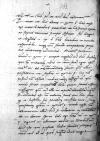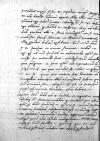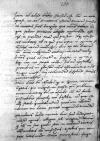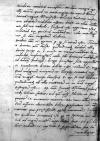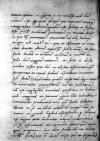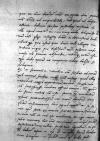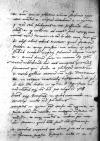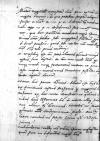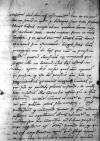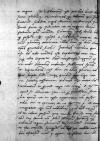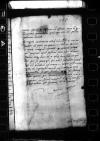Precor ut hic annus Vestrae Reverendissimae Dominationi laetis auspiciis ineat, laetioribus procedeat, et laetissimis exeat ac saepius recurrat semper felicior. Ad longas et elegantes Vestrae Reverendissimae Dominationis litteras brevibus et incultis respondebo, neque enim sinunt occupationes perpetuae rhetoricari cum amicis.
Maiorem partem litterarum Vestrae Reverendissimae Paternitatis occupat negotium cum domino ⌊Kostka⌋, qui tamen mitioribus verbis et causam suam egit apud ⌊maiestatem regiam⌋, ac written over et(?)⌈et(?) ac ac written over et(?)⌉ ad me superinscribed⌈meme superinscribed⌉ renuntiari fecit, quam illic praestiterit, ut scribit Vestra Reverendissima Paternitas. Cui non possum non compati, videor namque colligere mihi, quam acerbe ferat impotentiam written over s⌈samam written over s⌉[1] hominis, quem satius esset negligere, quam cum illo in apertam controversiam ingredi.
Pollicitus est mihi ⌊notarius⌋ suus, qui hic fuit, quod dominus ⌊Kostka⌋ sit pariturus consilio meo sitque quaesiturus gratiam Vestrae Reverendissimae Paternitatis, modo ipsa non contemneret illum, dum se voluerit ei reconciliare, et in hanc spem dedi ego litteras ad Vestram Reverendissimam Paternitatem, rogans, ne abnuat r written over ...⌈... illegible⌈...... illegible⌉rr written over ...⌉edire in concordiam cum homine isto, qui profecto habet faventes ⌊principes⌋ nostros vel ob id, quod singulis annis auget  AAWO, AB, D.67, f. 263v proventus regii fisci et propterea, ut ipse scripsit et alii dicunt inimicitiae exortae sunt illic contra eum, quamvis ego aliter sentio. Utcumque tamen se res habet, ego obtinui, quod ⌊maiestas regia⌋ iusserit dari ad ⌊illum⌋ litteras, quibus illi ei serio iniungitur, ut se intra modestiae fines contineat et honorem senatoribus illius provinciae debitum exhibeat, cum Vestra autem Paternitate Reverendissima pacifice et amice s vivat.
AAWO, AB, D.67, f. 263v proventus regii fisci et propterea, ut ipse scripsit et alii dicunt inimicitiae exortae sunt illic contra eum, quamvis ego aliter sentio. Utcumque tamen se res habet, ego obtinui, quod ⌊maiestas regia⌋ iusserit dari ad ⌊illum⌋ litteras, quibus illi ei serio iniungitur, ut se intra modestiae fines contineat et honorem senatoribus illius provinciae debitum exhibeat, cum Vestra autem Paternitate Reverendissima pacifice et amice s vivat.
Scribam et ego quoque ad ⌊eum⌋ fusius et admonebo ipsum promissi per ⌊notarium⌋ facti, adiungam etiam nonnulla, quae pungent, et spero ipsum obtemperaturum consiliis meis, per quae curabit st redire in gratiam Vestrae Reverendissimae Paternitatis. Quae pro naturae suae bonitate non denegabit admittere illum ad pristinum saltem gradum amicitiae suae. Quandoquidem non est eo processum, propter quod merito concordia abici debeat.
Reverendissime Domine.
Litteras ad dominum ⌊Kostka⌋ et regias et meas consultius mihi facturus videbar, quod mitterem per alium quam per hunc famulum Vestrae Reverendissimae Paternitatis, verum postea mutavi sententiam, subformidans, ne dum eg exspecto portitorem occurrentem, interea exoriatur iterum aliquid, quod alio consilio indigeret. Mitto itaque easdem per hunc famulum Vestrae Reverendissimae Paternitatis, quae per intermedias personas curabit, ut ad eum perferantur.
 AAWO, AB, D.67, f. 264r
AAWO, AB, D.67, f. 264r
Iam ab aliquot diebus sparsum est hic in aula, quasi v domini ⌊senatores istarum ⌊terrarum Prussiae⌋⌋ eo conatus suos dirigant, quo omnes Polonae linguae Polonae peritiores abigant excludant officiis et provincia etiam ipsa Prussiae idque cepisse eos meditari ab eo tempore, quo cepit Vestra Reverendissima Dominatio consiliis eorum interesse. Haec ex ore dominorum non omnino vulgarium audivi et reticere nolui. Litteras, quas ad ⌊maiestatem regiam⌋ scripsit Vestra Reverendissima Paternitas, legi ita, ut scriptae erant, sed cum apostillis providens, ne quibusdam verbis offenderetur mens regiae maiestatis, cui vehementer displicent similes controversiae.
Non omnino bene consultum, quod dominus ⌊Czema⌋ veniat legatus, qui magis ut propria quam publica curet, venturus dicitur, et obinde non tam facile persuadebit ⌊principibus⌋ contra ⌊Kostka⌋, cum quo est illi fatale quoddam odium, quod uni illorum, vereor, ne brevi pariat magnum detrimentum.
⌊Nicolaus Holste⌋ venit huc, suam dumtaxat causam agens, allegat sibi irrogatam iniuriam, quod non in suo gradu fori in iudicium tractus, non auditus, non confessus, testibus, qui et pars litis erant, convinci permissus, fuga
 AAWO, AB, D.67, f. 264v
tandem carceres evasit et hoc magis, quod illi crimen, quod in aula regia et apud commissarios regios commisisse dicitur, in iudicio inferiori obiectum indebite esset. Dicit et alia multa, ut solent rabulae. Iussus est exspectare istos nuntios ex quibus ⌊maiestas regia⌋ vult intelligere, ut se hoc negotium habuit.
AAWO, AB, D.67, f. 264v
tandem carceres evasit et hoc magis, quod illi crimen, quod in aula regia et apud commissarios regios commisisse dicitur, in iudicio inferiori obiectum indebite esset. Dicit et alia multa, ut solent rabulae. Iussus est exspectare istos nuntios ex quibus ⌊maiestas regia⌋ vult intelligere, ut se hoc negotium habuit.
Scribit mihi(?) Vestra Reverendissima Paternitas, quod si etiam ista Vestrarum Dominationum decreta contra ⌊Holste⌋, quemadmodum sordidi illius divitis ⌊Campe⌋, a sacra ⌊maiestate regia⌋ novis mandatis et indultis infringerentur, vult sibi deinceps interdicere ab huiusmodi iudiciis, ergo frustra sunt appellationes, si sacrosancta decreta debent esse Vestrarum Dominationum. Rogo, quid indignum iniquumve concepit senatus ex litteris regiis ⌊Campe⌋ concessis, si ita se res habuit, quemadmodum ab illo narratum et in litteris regiis descriptum est. Quod autem iuratis consiliariis potius credi debeat, fateor, sed
q(ua)n(do) or q(uo)n(iam) or qu(um)⌈q(ua)n(do)q(ua)n(do) or q(uo)n(iam) or qu(um)⌉
ipsi silent et pars queritur, et in carcere manet, an iam nullum remedium afferri clamitanti debet, praesertim ubi ea superinscribed in place of crossed-out ...⌈... illegible⌈...... illegible⌉ ea ea superinscribed in place of crossed-out ...⌉ narrat, quae praeseferunt apertam iniuriam. Insimulantur quidem senatores isti, quod eo spirent, ne ab eis ad ⌊regiam maiestatem⌋ appellatio fiat, sed quam bene haec audiant Vestra Reverendissima Dominatio pro prudentia sua bene intelligit.
 AAWO, AB, D.67, f. 265r
AAWO, AB, D.67, f. 265r
Novit optime Vestra Reverendissima Paternitas in universo orbe hunc morem esse, scilicet apud principem, qui superiorem neminem recognoscat, ultimum gradum esse iudicii et iustitiae. Est simile tribunal iudiciorum in ⌊ducatu Masoviae⌋, a quo tamen provocatur, provocatur ab omnibus iudiciis ⌊Regni⌋ ad ⌊maiestatem regiam⌋, quae et confirmat, et retractat decreta illorum, aequo tamen ferunt animo et profecto auctoritatis et sententiarum Vestrarum Dominationum maiestas regia solet habere magnam rationem et forte si ⌊Holste⌋ probare posset, quae hic in causa sua affirmat, apud iureperitos et aequos iudices comprobaret iniuriam sibi factam. Habendus quidem respectus dignitatis et eminentiae praepositorum, sed et subditorum non est negligenda tenuitas, praesertim in iudicio, ubi magnus et parvus aequa lance iudicandus est. Noverunt prudentes viri, quam facile labatur homo et si in omnibus actionibus, maxime autem sermone et proinde legibus adscripserunt, quod principes ex linguae petu lubricitate aliquid inhonestius in se effutientes contemnerent potius, quam castigare pergant. Haec ideo scribo, non ut tutari vellem factum aut etiam dictum ⌊Holste⌋, sed ut describam,  AAWO, AB, D.67, f. 265v quae et hic dicuntur nunc et postea dici poterunt non omnino ab imprudentibus. Nam quod ad ⌊Holste⌋ attinet, debuit forsan postulari iustitia de illo apud ⌊maiestatem regiam⌋, in cuius aula deliquisse dicitur, nam ubi quilibet castigari debeat a domesticis iudicibus quod pro istis, quae dicit vel allegat in iudicio regio pro defensione causae, possent inde nasci non pauca absurda. Utcumque actum est, ego dabo operam, ne impune cedat ⌊Holste⌋, si deliquit.
AAWO, AB, D.67, f. 265v quae et hic dicuntur nunc et postea dici poterunt non omnino ab imprudentibus. Nam quod ad ⌊Holste⌋ attinet, debuit forsan postulari iustitia de illo apud ⌊maiestatem regiam⌋, in cuius aula deliquisse dicitur, nam ubi quilibet castigari debeat a domesticis iudicibus quod pro istis, quae dicit vel allegat in iudicio regio pro defensione causae, possent inde nasci non pauca absurda. Utcumque actum est, ego dabo operam, ne impune cedat ⌊Holste⌋, si deliquit.
Quod dominus ⌊Ioannes a Werden⌋ non scribat ad curiam, vel rarius scribat, mea nihil refert, quod illius rationibus magis opportunum credidi, scripsi, ne non satisfecisse videar officio amici. Mihi quidem de facie notus non est, fama tamen virtutum ipsius pertractus sum, ut amem hominem, cui quantum inservierim hic apud ⌊maiestatem regiam⌋, si sciret ipse, forte ex amico fieret amicissimus. Quia vero et res est arcana, et ego non soleo mercari hoc modo amicitias, ut aliis parem hostilitatem, manebit perpetuo sepultum, si quando tamen dabitur copia Vestrae Reverendissimae Dominationi, in illius sinum licebit rem detegere et fidem eorum, quae scribo, facere.
 AAWO, AB, D.67, f. 266r
AAWO, AB, D.67, f. 266r
De domino comite ⌊palatino Rheni Frederico⌋ exspectat ⌊maiestas regia⌋ aliquam certitudinem a Vestra Reverendissima Paternitate, nam domini ⌊Philippus⌋ et ⌊Otto⌋ scripserunt huc maiestati regiae, quod vellent ad maiestatem suam uterque aut unus eorum venire et tam de dote aviae suae quam de aliis rebus rebus tractare, quod futurum suadet dominus ⌊dux Prussiae⌋, ut alicui ex istis fratribus tradatur nuptui filiarum aliqua maiestatis regiae. Quid demum fiet, in manu Dei est. Verum reddiderunt hic nos ancipites quorundam sermones, qui dicunt dominum ⌊Philippum⌋ comitem a morbo gallico etiamnum non esse immunem et in corpore cicatricibus deformatum. Si quid de hoc certi habet Vestra Reverendissima Dominatio, significet mihi, nam ⌊maiestas regia⌋ nondum scit aliquid de isto written over is⌈isoo written over is⌉.
Litteras super iurepatronatus in oppidis ⌊Neumark⌋ et Cowalye mitto cum praesentibus. ⌊Nepotes⌋ Vestrae Reverendissimae Paternitatis causa non cognita et parte altera non vocata in integrum restitui non possunt et neque ⌊maiestas regia⌋ induci potest, ut hoc faciat, quod alias facere non consuevit.
Dominus ⌊Cornelius Sceperus⌋ quae ad me s et ad dominum ⌊comitem in Tarnow⌋ scripsit, descripta mitto Vestrae Reverendissimae Dominationi.
 AAWO, AB, D.67, f. 266v
⌊Maiestas reginalis⌋ excusatam habet Paternitatem Vestram Reverendissimam de negotio ⌊Livoniae⌋, de quo putabat scriptum aliquid fuisse a ⌊maiestate regia⌋ Vestrae Paternitati Reverendissimae. Libenter tamen videret, ubi opera Vestrae Paternitatis Reverendissimae desiderium suae maiestatis iuvaret, quo haec provincia accederet regio imperio [...] hidden by binding⌈[...][...] hidden by binding⌉. Quod autem scribit sibi impositum silentium propter dominum ⌊ducem Prussiae⌋, quid sibi velit, non intelligo, nihil enim tale prius audivi.
AAWO, AB, D.67, f. 266v
⌊Maiestas reginalis⌋ excusatam habet Paternitatem Vestram Reverendissimam de negotio ⌊Livoniae⌋, de quo putabat scriptum aliquid fuisse a ⌊maiestate regia⌋ Vestrae Paternitati Reverendissimae. Libenter tamen videret, ubi opera Vestrae Paternitatis Reverendissimae desiderium suae maiestatis iuvaret, quo haec provincia accederet regio imperio [...] hidden by binding⌈[...][...] hidden by binding⌉. Quod autem scribit sibi impositum silentium propter dominum ⌊ducem Prussiae⌋, quid sibi velit, non intelligo, nihil enim tale prius audivi.
Dominus ⌊Nipschicz⌋ est mihi satis carus, quamvis vitiis ipsius sim hostis et hoc me male habet, quod neque morbi, neque fortunarum iactura et paene ipsa inopia mores eius immutare possunt. Deus det written over ...⌈... illegible⌈...... illegible⌉ det det written over ...⌉ exitum bonum.
Nova hic pauca habemus. Allatum est his diebus hidden by binding⌈[bus]bus hidden by binding⌉ ex finitimis castris ⌊Moscoviae⌋, quod ⌊magnus dux hidden by binding⌈[x]x hidden by binding⌉ Moscoviae⌋ ex hac vita decessit, et quamvis ex tribus locis conformes litterae de morte illius scribuntur, adhuc tamen haeremus, timentes ne strategemate nos ... superinscribed⌈... illegible⌈...... illegible⌉... superinscribed⌉ circumvenirent ⌊Mosci⌋. Diu tamen latere veritas non potest, brevi, quod certum est, sciemus.
⌊Cubiculario Volski⌋ non cedet impune negligentia, quam fecit in deferendis regiis litteris.
 AAWO, AB, D.67, f. 267r
AAWO, AB, D.67, f. 267r
+
Reverendissime Domine, domine mi observandissime.
Haec et in aurem, et in sinum Vestrae Reverendissimae Paternitatis dumtaxat sint dicta scriptave.
His diebus scripsit ad me quidam homo non de mediocri statu, aetatis maturae, famae et nominis laudati ... illegible⌈...... illegible⌉ et apud serenissimos ⌊principes⌋ nostros bonae opinionis seu aestimationis, longas satis litteras praemonens me de his, quae nunc in ⌊Prussia⌋ aguntur, quarum clausulas ex vernaculo, quo scripsit ille, in Latinum versas, his adscribere volui:
„Reverendissime Domine, nescio, quid nunc exoritur in ⌊Prussia⌋, quod isti domini Prussiae, qui sunt ex progenitoribus Germanis magnas levitates iis, qui sunt ex parentibus Polonis, inferunt et nullus tam insolenter illos contumelia afficit, quam dominus ⌊episcopus Culmensis⌋. Mittunt nuntios ad ⌊maiestatem regiam⌋, qui privata quam publica potius sunt curaturi. Item erant eius superinscribed⌈eiuseius superinscribed⌉ animi, quod voluerunt tentare, si quomodo obtinere possent, ne appellaretur ab eis ad ⌊maiestatem regiam⌋, nisi intervenisset haec controversia cum domino ⌊duce Prussiae⌋ super apellatione etc. Attamen fecerunt, hoc quod qui ab eis appellaverit, cogatur decem florenos reponere et hoc ideo, ut cum omnibus actionibus se eximant  AAWO, AB, D.67, f. 267v a ⌊Regno⌋. Item ⌊Gdanenses⌋ isti per hos annos ditati hidden by binding⌈[ati]ati hidden by binding⌉ sunt plurimum et videntes, quod ⌊Lubicenses⌋ qui prius fuerunt subditi regis ⌊Daniae⌋, eo divitiis perducti sunt, quod potentia et vi regem Daniae statuunt, quem volunt, ⌊Gdanenses⌋ itidem darent multum, quod possent esse exempti a subi written over d⌈dii written over d⌉ectione ⌊maiestati regiae⌋ et nunc plurimum adcrevit illis animi, quod habent duos ⌊episcopos⌋, gentiles suos. ⌊Ioannes Werden⌋, qui est homo altae mentis, est capitaneus iam et super alio capitaneatu habet consensum regium etc. Et inde ⌊Gdanenses⌋ induunt sublimes spiritus et cogitationes, etc.”
AAWO, AB, D.67, f. 267v a ⌊Regno⌋. Item ⌊Gdanenses⌋ isti per hos annos ditati hidden by binding⌈[ati]ati hidden by binding⌉ sunt plurimum et videntes, quod ⌊Lubicenses⌋ qui prius fuerunt subditi regis ⌊Daniae⌋, eo divitiis perducti sunt, quod potentia et vi regem Daniae statuunt, quem volunt, ⌊Gdanenses⌋ itidem darent multum, quod possent esse exempti a subi written over d⌈dii written over d⌉ectione ⌊maiestati regiae⌋ et nunc plurimum adcrevit illis animi, quod habent duos ⌊episcopos⌋, gentiles suos. ⌊Ioannes Werden⌋, qui est homo altae mentis, est capitaneus iam et super alio capitaneatu habet consensum regium etc. Et inde ⌊Gdanenses⌋ induunt sublimes spiritus et cogitationes, etc.”
Haec et alia plura ad me scripta sunt, neque quidem hac lege, ut ea secretius asservem, sed nolo esse auctor discordiarum et proinde rogo, ut Vestra quoque Dominatio Reverendissima apud se contineat ista, et pro prudentia sua det operam, ut re ipsa appareat non posse talia dici et opinari de Vestra Reverendissima Paternitate, de cuius integritate ego nihil addubito, sed nihil etiam ab ea celare possum, quo iacula praevisa minus feriant hidden by binding⌈[iant]iant hidden by binding⌉ etc, cui faveo non solum ⌊principum⌋, sed omnium quoque ordinum ⌊Regni⌋ favorem et amorem. Vereor, ne ista commenta spargantur ab his, qui vellent impedire ascensum Vestrae Paternitatis Reverendissimae et quamvis haec, ubi  AAWO, AB, D.67, f. 268r vera essent, non possent non officere, spero tamen, quod innocentia praevalebit, quam ego, ubi ubi potero, strenue iuvabo.
AAWO, AB, D.67, f. 268r vera essent, non possent non officere, spero tamen, quod innocentia praevalebit, quam ego, ubi ubi potero, strenue iuvabo.
In negotio coadiutoriae contuli cum ⌊maiestate regia⌋, cui persuadere non potui, ut optaret in hac re operam domini ⌊ducis⌋, indignum reputans, quod externus princeps quam proprius apud subditum plus posse debeat. Maluit itaque dare ad dominum ⌊episcopum⌋ {dare} litteras et ipsa hoc per se potius quam per alium postulare, quas ego cum praesentibus ad manus Vestrae Reverendissimae Paternitatis mitto una et exemplum earum, ut intelligat, quo argumento scriptae sint, alia quoque facturus, quae potero, pro honore et commodo Vestrae Reverendissimae Paternitatis.
Cuius me in fraternum amorem plurimum commendo.
 AAWO, AB, D.67, f. 263v proventus regii fisci et propterea, ut ipse scripsit et alii dicunt inimicitiae exortae sunt illic contra eum, quamvis ego aliter sentio. Utcumque tamen se res habet, ego obtinui, quod
AAWO, AB, D.67, f. 263v proventus regii fisci et propterea, ut ipse scripsit et alii dicunt inimicitiae exortae sunt illic contra eum, quamvis ego aliter sentio. Utcumque tamen se res habet, ego obtinui, quod  AAWO, AB, D.67, f. 264v
tandem carceres evasit et hoc magis, quod illi crimen, quod in aula regia et apud commissarios regios commisisse dicitur, in iudicio inferiori obiectum indebite esset. Dicit et alia multa, ut solent rabulae. Iussus est exspectare istos nuntios ex quibus
AAWO, AB, D.67, f. 264v
tandem carceres evasit et hoc magis, quod illi crimen, quod in aula regia et apud commissarios regios commisisse dicitur, in iudicio inferiori obiectum indebite esset. Dicit et alia multa, ut solent rabulae. Iussus est exspectare istos nuntios ex quibus  AAWO, AB, D.67, f. 265v quae et hic dicuntur nunc et postea dici poterunt non omnino ab imprudentibus. Nam quod ad
AAWO, AB, D.67, f. 265v quae et hic dicuntur nunc et postea dici poterunt non omnino ab imprudentibus. Nam quod ad  AAWO, AB, D.67, f. 266v
AAWO, AB, D.67, f. 266v
 AAWO, AB, D.67, f. 267v a
AAWO, AB, D.67, f. 267v a  AAWO, AB, D.67, f. 268r vera essent, non possent non officere, spero tamen, quod innocentia praevalebit, quam ego, ubi ubi potero, strenue iuvabo.
AAWO, AB, D.67, f. 268r vera essent, non possent non officere, spero tamen, quod innocentia praevalebit, quam ego, ubi ubi potero, strenue iuvabo.